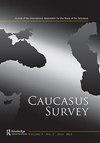在阿布哈兹后殖民记忆政治中重建民族英雄——关于凯莱什·贝·谢瓦希泽的争论
IF 0.4
Q3 AREA STUDIES
引用次数: 0
摘要
本文通过文化抵抗的棱镜,分析了从改革时期到今天,凯莱什·贝伊·舍瓦希泽亲王(生于1747年)在阿布哈兹记忆政治中的形象重建。它认为,阿布哈兹政客在塑造凯莱什·贝伊形象时使用了双重方法。一方面,王子反对俄罗斯和苏联殖民制度的反殖民叙事被创造出来,另一方面,与俄罗斯庇护阿布哈兹未被承认的国家地位相一致的更传统的殖民叙事也被鼓励。然而,对这些话语的争论是形式性的。恢复俄罗斯和苏联对凯莱什·贝伊的解读的唯一真正目的是掩盖阿布哈兹对俄罗斯的文化抵抗,因为后者本身具有双重身份,既体现了阿布哈兹的前帝国中心,又体现了其现代赞助人。本文章由计算机程序翻译,如有差异,请以英文原文为准。
Reconstructing a National Hero in the Post-colonial Memory Politics of Abkhazia: Debates over Kelesh Bey Shervashidze
This article analyzes the reconstruction of the image of Prince Kelesh Bey Shervashidze (b. 1747) in the memory politics of Abkhazia through the prism of cultural resistance, from the perestroika period up to the present day. It argues that Abkhaz politicians use a dual approach to constructing the figure of Kelesh Bey. On the one hand, an anti-colonial narrative of the prince in opposition to the Russian and Soviet colonial system is created, and on the other hand, a more traditional colonial narrative aligned with Russia’s patronage of Abkhazia’s unrecognised statehood is also encouraged. However, the controversy over these discourses is formal in nature. The only real purpose of reviving the Russian and Soviet readings of Kelesh Bey is to hide Abkhaz cultural resistance from Russia, owing to the latter’s own dualistic status as embodying both Abkhazia’s former imperial center and its modern patron.
求助全文
通过发布文献求助,成功后即可免费获取论文全文。
去求助
来源期刊

Caucasus Survey
Arts and Humanities-History
CiteScore
1.30
自引率
9.10%
发文量
4
期刊介绍:
Caucasus Survey is a new peer-reviewed, multidisciplinary and independent journal, concerned with the study of the Caucasus – the independent republics of Armenia, Azerbaijan and Georgia, de facto entities in the area and the North Caucasian republics and regions of the Russian Federation. Also covered are issues relating to the Republic of Kalmykia, Crimea, the Cossacks, Nogays, and Caucasian diasporas. Caucasus Survey aims to advance an area studies tradition in the humanities and social sciences about and from the Caucasus, connecting this tradition with core disciplinary concerns in the fields of history, political science, sociology, anthropology, cultural and religious studies, economics, political geography and demography, security, war and peace studies, and social psychology. Research enhancing understanding of the region’s conflicts and relations between the Russian Federation and the Caucasus, internationally and domestically with regard to the North Caucasus, features high in our concerns.
 求助内容:
求助内容: 应助结果提醒方式:
应助结果提醒方式:


